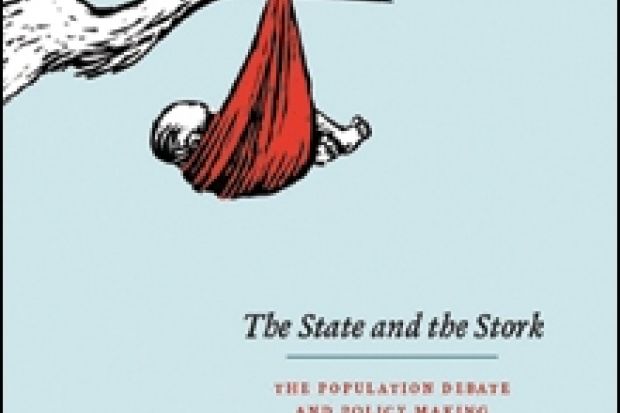As the world's population topped 7 billion in October 2011, commentators pondered the meaning of this moment. Was this the herald of global environmental apocalypse or the proof of an unprecedented socio-economic miracle? A few months later, the UK's Office for Budget Responsibility warned of collapse in the social security system if current trends towards an ageing population continued unabated, the ratio of workers to their dependants being unprecedented and unsustainable. Finally, last summer saw fears of a new food price "spike" akin to that of 2008-09 in the wake of failed harvests in the US. These might appear to be three unrelated stories from the past 12 months but each in fact conjoins the realms of demography, politics and resources. Each treads the territory first charted by Thomas Malthus more than two centuries ago.
In his excellent book The State and the Stork, Derek Hoff examines the ways in which economists, demographers, social scientists and politicians in the US have traced patterns in Malthus' domain. Hoff starts in the Age of Independence, with President James Madison's Federalist vision dismissing Malthusian fears as inapplicable to a vast, uncultivated frontier society, while in contrast, Jeffersonian Republicanism already saw in population growth the worm that could eat the civic virtue of the fledgling nation to a hollow core.
So, down the generations Hoff skilfully traces the complex debates that have accumulated around the nexus of population, resources and politics. As becomes clear, for every individual like the political economist Amasa Walker, for whom Malthus' was a "British philosophy...perverted and diseased from its root" and thus inapplicable across the Atlantic, there was a countervailing supporter who championed the ineluctable timeliness of his insights. Thus the interwar years saw Malthus tied to a eugenics that was oft discredited but equally implicated in a highly influential "steady state" version of Keynesianism that emerged after the closing of the frontier and was important in the construction of the New Deal.
Likewise, Malthusian arguments were reworked and reached a peak of popular and political influence in the post-war era thanks to the ecologically driven rebranding of his ideas as presaging global environmental collapse, the "population bomb" in Paul Ehrlich's celebrated phrase being seen as every bit as dangerous as its atomic equivalent. Yet at the same time there emerged a new, anti-Malthusian orthodoxy wherein economists and then the Reagan administration argued that market forces would send the signals that led population levels to adjust to resource availability. Hoff also emphasises just how contingent are the connections between political parties and population politics: if Ronald Reagan's Republicanism was anti-Malthusian, seeing in state-sponsored population policies an interference with market forces, that of his predecessors at the onset of the 20th century, for example, was squarely supportive of Malthus because of fears of overcrowding. Hoff shows how the alignment of politics and population, like some vast historical fruit machine, varies with every pull on the historical handle.
The State and the Stork brings its story right up to the present, suggesting that an age of climate change should rouse Americans from a "forty-year slumber" on the issue of population and its political implications. Americans must tread Malthus' territory once more. Hoff's is an elegant clarion call to demographic arms, and yet one wonders who will heed it. He proves an assured guide through two centuries of Malthusian wrangling, but for as long as scholars, politicians and the media remain unable to see the links between stories about demographic balance, food prices and public policy, they will not wake to Hoff's concluding message. For now, and despite Hoff's best efforts, Malthus sleeps on.
The State and the Stork: The Population Debate and Policy Making in US History
By Derek S. Hoff University of Chicago Press
392pp, £31.50
ISBN 9780226347622 Published 22 October 2012
Register to continue
Why register?
- Registration is free and only takes a moment
- Once registered, you can read 3 articles a month
- Sign up for our newsletter
Subscribe
Or subscribe for unlimited access to:
- Unlimited access to news, views, insights & reviews
- Digital editions
- Digital access to THE’s university and college rankings analysis
Already registered or a current subscriber? Login
